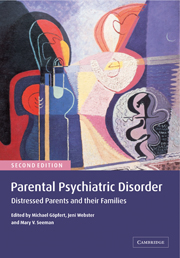Book contents
- Frontmatter
- Contents
- List of contributors
- Foreword
- Preface
- Part I Basic issues
- Part II Comprehensive assessment and treatment
- Part III Specific disorders: the impact on parent–child relationships
- Part IV Specific treatments and service needs
- 16 Psychopharmacology and motherhood
- 17 Social work issues
- 18 Parental psychiatric disorder and the law: the American case
- 19 Parenting and mental illness. Legal frameworks and issues – some international comparisons
- Part V Child-sensitive therapeutic interventions
- Part VI Models for collaborative services and staff training
- Afterword
- Index
- References
17 - Social work issues
from Part IV - Specific treatments and service needs
Published online by Cambridge University Press: 09 August 2009
- Frontmatter
- Contents
- List of contributors
- Foreword
- Preface
- Part I Basic issues
- Part II Comprehensive assessment and treatment
- Part III Specific disorders: the impact on parent–child relationships
- Part IV Specific treatments and service needs
- 16 Psychopharmacology and motherhood
- 17 Social work issues
- 18 Parental psychiatric disorder and the law: the American case
- 19 Parenting and mental illness. Legal frameworks and issues – some international comparisons
- Part V Child-sensitive therapeutic interventions
- Part VI Models for collaborative services and staff training
- Afterword
- Index
- References
Summary
Introduction
This chapter is written from the perspective of a mental health social worker serving women diagnosed with schizophrenia. The Women's Clinic in which I work operates out of the Center for Addiction and Mental Health, Toronto, Canada. It offers assessment and individual and group treatment, with a special focus on women who are mothers (Seeman & Cohen, 1998).
Clinic participants come from varying backgrounds and present with a range of needs and experiences. Importantly, they vary in their awareness of the degree to which mental illness has compromised their ability to perform adequately as parents. The connection between acknowledgement of illness, adherence to a medication regime, participation in a treatment programme and maintenance of child custody is self-evident to some and not at all to others.
Some refuse to take medication because they are not convinced they are ill. Some understand that they require treatment in order to prevent recurrence of acute mental illness, but do not make the connection between illness exacerbation and the need for the child to be taken into state custody. As a social worker, I am often caught between the immediate best interests of the child and the crucial importance to the ill mother of retaining a close parental bond with her child.
In the Province of Ontario, the Family and Child Services Act provides the legal mandate for Child Welfare Agencies to either monitor or apprehend (remove) a child from parents or caregivers under specified conditions (Province of Ontario, Child and Family Services Act, 1990); the best interests of the child normally trump the rights of parents.
- Type
- Chapter
- Information
- Parental Psychiatric DisorderDistressed Parents and their Families, pp. 249 - 256Publisher: Cambridge University PressPrint publication year: 2004



